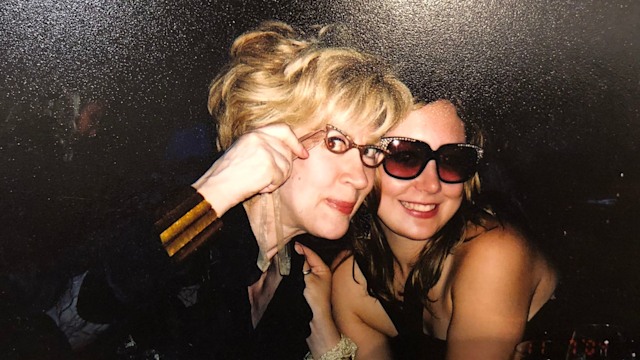There’s another woman in my marriage. My late mother.
It’s a creepy thing to admit, but it’s the truth. My dead mother’s presence in my life and relationship looms larger for me than if she lived next door to my family. (Which, I assure my husband, she most definitely would have done if she were still around.)
Though she died 19 years ago, in small ways, I try to bring her back every day. I wear her clothes and accessories. I whisper to photos. I write essays about her. I get piercings on my face and visible tattoos in the hope she might rage at me. I’m desperate to feel something from her, and I’ll take anything: love, affection, advice, even criticism.
There are times when I’m arguing with my husband about something nonsensical such as whose turn it is to buy porridge oats, when I realise it’s not about the oats or the food shop. I’m not even talking to my husband at all. I’m trying to get my mother’s attention.
My mother died while I was in Paris during my year abroad. Her death felt like the end of me having any family (my father is estranged and I didn’t know my half-siblings at the time), but one of my amazing friends turned up the day after the worst of days. He helped me pack all my stuff and get back to England, where I still had a year of university to complete.
That best friend, Will, became my boyfriend, husband and the father of my four kids, so grief and love have long coexisted in our partnership. That weekend in Paris kicked off a series of new stitches in the fabric of our friendship: I started to see him as family and much more than just a friend.
After my mother’s death, I believed that with enough costume changes (and masks), I’d get to the end of my tragedy. I’d heal, be whole again.
I also thought I could run from it and realised that running doesn’t always look like what you imagine it will. There was no recklessness or bad behaviour; instead, at 25, I moved in with Will, got a dog, then engaged, fell pregnant, got married and then we had three more children in relatively quick succession.
Will and I have spent much of our marriage extremely busy with everyday chaos, so it’s only recently I’ve started to think about how much of an impact my mother’s death had, and continues to have, on our story.
READ: What therapists want you to know about grief
Though the weight, texture and shape of my grief have changed over time, it’s like a particularly stubborn pair of PVC leggings that I can’t seem to get off so am now wearing out to every occasion – whether it’s the appropriate outfit or not.
Will is more than a husband. He’s a support system and cheerleader and co-parent and bestie, and in some ways, a carer figure for me, too. I don’t seek advice or approval from my parents because I can’t, but I’ve noticed my husband’s reaction to things can fill me with pride, or kick off an unexpected tantrum. (I’m working on that.)
Will takes care of lots of the ‘adult’ stuff in our relationship: organising, scheduling, booking things and I could list so many reasons why - he’s better at it, I’m doing all the kidmin, I have poor executive function, I would rather have a root canal than book anything - but truthfully, part of me craves the bustle of someone taking care of me. I miss it.
Not growing up with my dad, I was never going to be a person who ‘married my father,’ but lately, I’ve been joking to friends that I ended up marrying my mum. Just like her, Will is loving, exacting, ambitious and always pushing himself and others.
I sometimes feel embarrassed by how dependent I am as a partner, but I have learnt that hiding my pain (and the many ways I can be a pain!), doesn’t work. It won’t make me a more functional partner, parent or human being.
RELATED: How can I stop relying on my friends for happiness? An expert's guide
Since I turned 40, I’ve committed to stop comparing myself to others, and that goes for how I dress, how I behave, the way I parent and how my relationship is perceived by people outside of it. I’m lucky that I have friends I love like family, and my relationship with my husband improved immensely once I started confiding in them, crying on shoulders and asking for advice.
It has not been easy for me to open myself up to love as an adult and reframe my understanding of myself as worthy, not damaged. By showing up for me and our kids every single day, my husband has shown me I am deserving. I now see and acknowledge the many positives – emotional, creative, intellectual – I bring to our family and our partnership.
READ: How tidal swimming helped me make sense of incomprehensible grief
People don’t like to think about their loved ones not being there for the ‘big’ life moments, but the most painful part of my loss has been my mother missing out on the banal everyday stuff. Watching a TV show on the sofa. Eating sushi. Giggling with my kids.
In a way, she was at my wedding 13 years ago: a significant part of Will’s speech was dedicated to my mother. I like to think it was his way of telling me he knew she was coming along for our ride.
